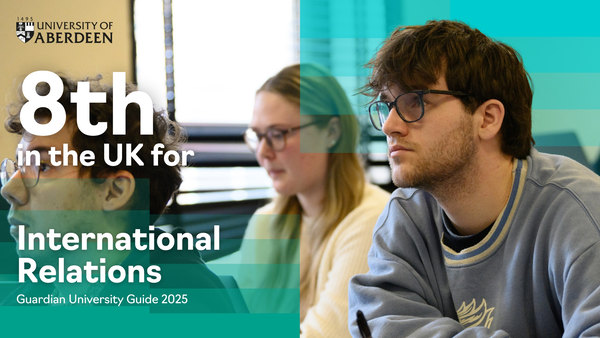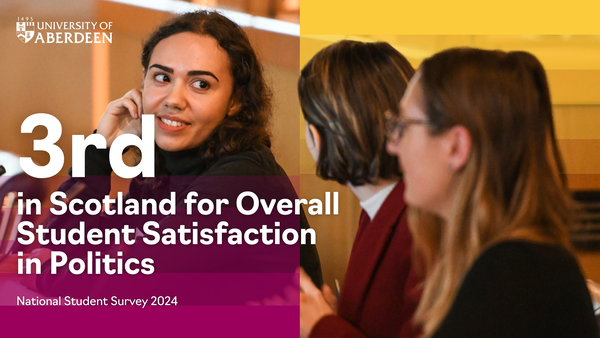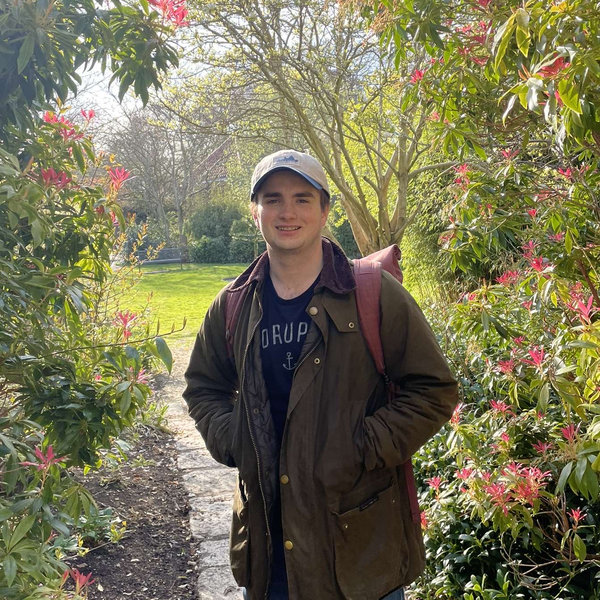
Introduction
The MSc in International Political Economy (IPE) is designed for those seeking to engage with the pressing economic and political challenges of our time, from financial crises and trade disputes to global inequality and sustainable development.
You will be equipped with the knowledge and analytical skills to critically assess the structures, hierarchies, and power dynamics that govern finance and trade, drive globalisation and economic nationalism, and shape the distribution of wealth and poverty within and across states, regions, and the world.
This course has both January and September start dates. Apply Now
Study Information
Study Options
- Learning Mode
- On Campus Learning
- Degree Qualification
- MSc
- Duration
- 12 months or 24 months
- Study Mode
- Full Time or Part Time
- Start Month
- September or January
- Location of Study
- Aberdeen
The MSc in International Political Economy provides a comprehensive understanding of the interplay between politics and economics in the global system. You will explore the conceptual and theoretical foundations of IPE, focusing on how globalisation has transformed the movement of capital, goods, and labour. The programme examines key issues such as neoliberalism, international trade, financialisation, economic nationalism, gender and the global economy, development and post-development, and poverty and inequality.
Through a combination of core courses and optional specialisations, you will develop the ability to analyse complex global economic challenges from multiple perspectives. You will critically engage with contemporary debates on international finance, trade agreements, and the role of international institutions, bridging the gap between theory and real-world policy.
Beyond academic knowledge, this programme equips you with practical skills highly valued by employers. You will develop expertise in policy analysis, data interpretation, and economic research, preparing you for careers in government, international organisations, NGOs, think tanks, multinational corporations, and financial institutions.
With a strong focus on critical thinking, problem-solving, and the intersection of political and economic forces, this programme ensures you graduate with the skills and insights necessary to navigate and influence the rapidly evolving global economic landscape.
Available Programmes of Study
- MSc
-
International Political Economy
Qualification Duration Learning Mode Study Mode Start Month LocationMSc 12 months or 24 months On Campus Learning Full Time or Part Time September MoreMSc 12 months or 24 months On Campus Learning Full Time or Part Time January Aberdeen MoreProgramme Fees
Fee information Fee category Cost EU / International students £23,000 Tuition Fees for 2025/26 Academic Year UK £11,100 Tuition Fees for 2024/25 Academic Year
We will endeavour to make all course options available. However, these may be subject to change - see our Student Terms and Conditions page.
Fee Information
Additional Fee Information
- Fees for individual programmes can be viewed in the Programmes section above.
- In exceptional circumstances there may be additional fees associated with specialist courses, for example field trips. Any additional fees for a course can be found in our Catalogue of Courses.
- For more information about tuition fees for this programme, including payment plans and our refund policy, please visit our Tuition Fees page.
Scholarships
All eligible self-funded international Postgraduate Masters students starting in September 2025 will receive an £8,000 scholarship. Learn more about this Aberdeen Global Scholarship here.
To see our full range of scholarships, visit our Funding Database.
How You'll Study
Teaching will comprise lectures, student-led seminars, student-led class presentations and close and critical reading of texts.
Learning Methods
- Lectures
- Seminars
Assessment Methods
By written exam, essay work, class presentation and project work as prescribed for each course and by submission of a dissertation.
Formative assessment comprises class presentations and student led seminars on which oral and written feedback will be provided
Summative assessment comprises discursive, reflective essays and a dissertation
Why Study International Political Economy?
- You will analyse tariff policies, political economies, social and political pressures and how these influence the political process, learning about the impact of policies on the public and trade in a global context
- Aberdeen is ranked 8th in the UK for International Relations (Guardian University Guide 2025) and 3rd in Scotland for Overall Student Satisfaction in Politics (National Student Survey 2024)
- Learn from experts actively involved in research. The University of Aberdeen is home to several research centres and institutes, including the Centre for Global Development; the Centre for Global Security and Governance; the Institute for Conflict, Transition, and Peace Research; and more
- The University of Aberdeen has been ranked a Top 10 university for Overall Student Satisfaction for four consecutive years (National Student Survey 2021, 2022, 2023, 2024)
Entry Requirements
Qualifications
The information below is provided as a guide only and does not guarantee entry to the University of Aberdeen.
Applicants for admission will normally be expected to hold a relevant Honours degree with a 2:1 standard from a recognised university or body in International Relations, Politics, Economics, Management, Business Studies, Law, Geography, History or cognate subject deemed appropriate by the School of Social Science.
Applicants without this qualification may be admitted subject to having an alternative qualification, or an approved level of work experience appropriate to the field of study e.g. government officials, members of UK or other armed forces, officials of International Organizations and business executives. Also taken into careful consideration is the trajectory of results, an applicant without an overall 2.1 but with 2.1 results in their final two years of study may be admitted.
Please enter your country or territory to view relevant entry requirements.
English Language Requirements
To study for a Postgraduate Taught degree at the University of Aberdeen it is essential that you can speak, understand, read, and write English fluently. The minimum requirements for this degree are as follows:
IELTS Academic:
OVERALL - 6.5 with: Listening - 5.5; Reading - 6.0; Speaking - 5.5; Writing - 6.0
TOEFL iBT:
OVERALL - 90 with: Listening - 17; Reading - 21; Speaking - 20; Writing - 21
PTE Academic:
OVERALL - 62 with: Listening - 59; Reading - 59; Speaking - 59; Writing - 59
Cambridge English B2 First, C1 Advanced or C2 Proficiency:
OVERALL - 176 with: Listening - 162; Reading - 169; Speaking - 162; Writing - 169
Read more about specific English Language requirements here.
Document Requirements
You will be required to supply the following documentation with your application as proof you meet the entry requirements of this degree programme. If you have not yet completed your current programme of study, then you can still apply and you can provide your Degree Certificate at a later date.
- Degree Certificate
- a degree certificate showing your qualifications
- Degree Transcript
- a full transcript showing all the subjects you studied and the marks you have achieved in your degree(s) (original & official English translation)
- Personal Statement
- a detailed personal statement explaining your motivation for this particular programme
- Reference x 2
- two reference letters, one of which should be from your university discussing your academic ability. If you have been out of education for a long time you may wish to use your current or most recent employers, or other professional individuals
Aberdeen Global Scholarship
Eligible self-funded Postgraduate Taught (PGT) students will receive the Aberdeen Global Scholarship. Eligibility details and further information are available on our dedicated page.
Aberdeen Global ScholarshipCareers
Graduates may pursue roles in economic policy development, international trade analysis, risk assessment, consultancy, journalism, or further academic research.
Careers relating to International Political Economy involve policymaking and research in organizations working in the fields of development, health, energy law and migration.
Many graduates choose to do public advocacy, research and project management work for non-governmental organisations (NGOS), and regional and global institutions such as the European Union or the United Nations.
Graduates also forge careers in international institutions like the World Bank, International Monetary Fund, international media, the armed forces, international risk management, and international corporations involved in trade and finance.
An MSc qualification in International Political Economy will be an important asset to you if you already hold an undergraduate degree in Business, Economics, International Relations or Politics, given the increasing demands for postgraduate qualifications in the job market. In addition, graduates from cognate disciplines can use this route to change their career path or improve their qualifications within the framework of an existing career.
Career Opportunities
- Civil Servant
- Diplomacy, Defence, Development
- Government Officer
- NGO Worker (Charity Worker)
- Policy Advisor
- Project Manager
- Public Advocacy
What our Alumni Say
Our Experts
- Programme Coordinator
- Dr Ritu Vij
Information About Staff Changes
You will be taught by a range of experts including professors, lecturers, teaching fellows and postgraduate tutors. However, these may be subject to change - see our Student Terms and Conditions page.
Facilities
Learn from experts actively involved in research. The University of Aberdeen is home to several research centres and institutes.
Centre for Sustainable Development
Centre of excellence committed to inter-sectoral & interdisciplinary working for equity, social justice & sustainable futures. A space at the University for staff, students, practitioners & the public to develop collaborative teaching & research.
Find out moreCentre For Global Security and Governance
The Centre for Global Security and Governance brings together academic experts, policy makers, and students to define, analyse, and propose remedies to the most pressing security and governance challenges the world faces in the 21st century.
Find out moreThe Institute For Conflict, Transition And Peace Research
ICTPR at the University of Aberdeen brings together a diverse and interdisciplinary group of scholars and students to develop in-depth theoretical understandings of the concepts and practices of transitions in terms of conflict and peace.
Find out moreGet in Touch
Contact Details
- Address
-
Student Recruitment & Admissions
University of Aberdeen
University Office
Regent Walk
Aberdeen
AB24 3FX





